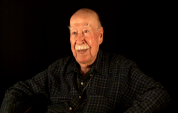5:39 | Everyone else was scared of General Puller, but Bill Bates approached the legendary Marine to ask a favor, which he got, along with an earful. At this point in the war, he had become the operations officer, after the division had withdrawn from North Korea.

The Army and the Navy offered him commissions in support units but there was a war on and Bill Bates was not going to let the adventure pass him by. It was the Marines for him.
New Marine officer Bill Bates was first assigned to the Marine detachment aboard a troop ship, then aboard the carrier Lexington. He sailed both oceans in the last year of the war, ferried missionaries and guarded German prisoners. He went ashore in Japan for occupation duty.
There were plenty of crashes aboard the USS Lexington says Bill Bates, who commanded the Marine detachment aboard ship. He describes the hazardous landings that were routine for Navy pilots and tells how the crew managed to shoot down a kamikaze before he could finish his work.
The Marine Corps was fortunate. When the Korean War broke out their numbers were greatly reduced, but back at Camp Lejeune, Bill Bates had been training reserves and they were ready to fight. He details the armament of a Marine heavy weapons company and praises his mortar platoon commander, Eugene Paradis, who devised a targeting method that was adopted by the entire Corps.
After long preparation, the complex Inchon landing was finally underway. Going ashore with his heavy weapons company, Marine Bill Bates joined the fighting in and around Seoul. The men were urged on by the most decorated Marine in history, Chesty Puller.
The North Koreans had retreated northward and Bill Bates and his Marines were finally able to take hot showers under the curious watch of a local crowd. They returned to the fight, pushing toward the Yalu River when reports of Chinese units started coming in.
He charmed his way onto a helicopter to do his reconnaissance so often, Bill Bates wound up with an air medal. The steep Korean mountains and frigid weather were difficult to deal with. The cold was responsible for the overnight ordeal of waking and massaging feet, ears, and noses.
It wasn't written up, but the Battle of Horseshoe Ridge was a furious fight against advancing Chinese troops, who had entered the war and were now leading the push toward the South. Bill Bates tells how his men got through that ordeal and how they got out of it with a beautiful "retrograde maneuver."
Faced with a difficult assault, Bill Bates and his unit were able to walk away after a furious artillery barrage which drew on multiple batteries. This was his last big action of the war and he was soon on his way home.
At the end of the Big War, Bill Bates served as commander at two Marine barracks including Lakehurst, New Jersey, where airships were stationed and where a famous zeppelin had crashed. Then it was back to Quantico for amphibious warfare school, where he learned the complex and difficult aspects of landing troops on an unfriendly beach.